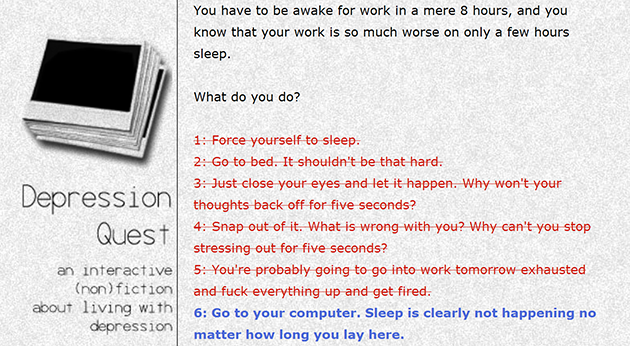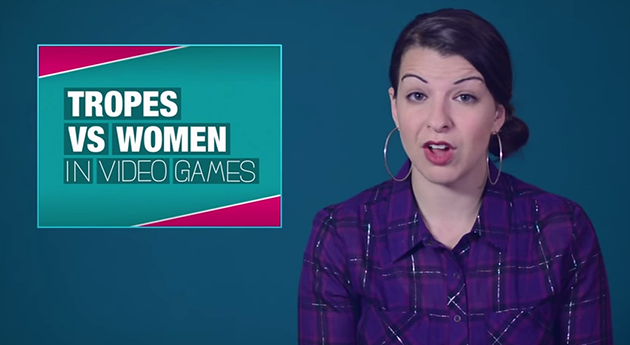If you’ve picked up a gaming controller over the past few months, or have had your nose in any form of gaming-relating media during that time, you’re probably quite familiar with the term GamerGate. But if you’re not involved in that particular corner of the internet, it’s entirely likely that you’re unaware of the storm of controversy – and some really horrific acts of threat and fear mongering – that’s evolved from a single blogpost by a jilted ex-boyfriend. With seemingly no end in sight, and a swathe of prominent female gaming industry members targeted, it’s probably time to familiarise (or re-familiarise) yourself with the timeline and bare bones facts about what exactly has gone down, and why it’s possibly the most dangerous and disgusting movement the Internet age has seen for quite some time. This explainer article will hopefully have the answers to all your #gamergate questions.
Oh, god. This one’s gonna make me real angry, isn’t it.
Yeah, you’d better strap in. This will get real raw in a big hurry.
Ok, ok. *exhales, finds centre* What is GamerGate in a nutshell?
Other than being a word for a female ant capable of reproducing in colonies where a Queen is not present (
seriously), GamerGate is a “movement” – for lack of a better term – that concerns issues of sexism, misogyny, journalistic ethics, and conflicts of interest between gaming media and game developers. But far from being a conversation that needed to be had, it has grown to include systemic harassment of prominent female gaming industry figures involving breaches of privacy, ferocious bullying, and threats of a violent and sexual nature.
Bloody hell. Alright, take us back to the beginning. What happened?
The whole thing has to do with the fact that tropes and characterisation within the vast majority of games slant male, despite at least half – if not more – of all gamers being female. The ingrained sexism and objectification of females within games has been an issue that’s been slowly bubbling away for quite some time. Then, in August of this year, a dude named
Eron Gjoni wrote
an extremely long blog post about his ex-girlfriend.
…and?
And what?
And what else lead to the start of all this?
Nothing.
What?
Yep.
You’re kidding. That’s it?
That’s the incident that started this whole mess, yes.
Holy crap. What was in that blog?!
An extraordinarily long and detailed account of Eron’s relationship with a girl named Zoe Quinn that didn’t end particularly well, including allegations (and admissions) of cheating. That’s quite literally the crux of the story. It’s written in 7 “acts” and runs to about 9000 words, including mountains – seriously, MOUNTAINS – of screen captured Facebook chat logs. He meticulously details each man she had slept with whilst either in the relationship or “sort of on a break,” and speculates wildly about the general activities of her vagina.
Good lord. That’s messed up. So who is Zoe Quinn?
Zoe Quinn is an indie game designer who developed a text-based interactive narrative game called Depression Quest that gives a frank and jarring account of living with depression. It’s not a good game in the strictest sense of the word. But it is a very important piece of work and contains the kind of honest representation of mental illness that is rarely – if ever – seen in games. The game was successfully pitched to Steam Greenlight and subsequently released in August of this year. Around about the same time, Eron’s blog post went public and the shit really hit the fan.
Big deal. A guy had a crummy relationship and some bad stuff happened. That’s literally happened to everyone.
Right. And this is when the journalistic ethics argument arose.
I… It… How… How exactly did that happen?
As reluctant as I am to re-air someone else’s dirty (personal) laundry in public again… The shortest and easiest explanation is that one of the alleged incidents of infidelity was with a guy by the name of Nathan Grayson.
Who?
Nathan Grayson. At the time he was a freelance gaming writer, but has since moved to a permanent position at popular gaming website Kotaku.
Oooookay?
Part of Eron’s rambling, at times incoherent, at other times totally out-of-its-head ridiculous rant kind of, sort of
implied that the extra-curricular activities happened between Grayson and Quinn because Quinn was seeking favourable coverage for
Depression Quest – y’know, the kind of deluded thinking that people are prone to when they’re looking for explanations in ineffable situations. A select group of people latched on to this little tit bit and really took the ball and ran, claiming it was evidence of endemic corruption within gaming media. It’s just that this particular claim is what we in the media industry refer to as being “
absolutely, not even remotely, true.“
So what happened then?
Things got scary, quickly. Quinn became the target of sustained and systemic abuse from an ever-growing base of nutcases. Some of which
was fucking horrific, and most of which had a disturbing amount of
planning and forethought put into it. Most of which included online harassment, hacking and publication of files and personal information, abusive phone calls and threats made towards her family and friends, and the general targeting of anyone who dared step in to her defence. A mountain of it included rape and death threats.
Ugh. I feel sick.
And that was just the beginning. Around about this time, noted feminist game critic
Anita Sarkeesian releases
a new episode in a series of videos she’s producing that looks at the objectification of women in video games entitled “
Women as Background Decoration.” By proxy, she gets sucked into this mess and also becomes the target of abuse, hacking, rape and death threats – to the point of filing a police report and having to flee her home due to one particularly nasty and specific credible threat. Around this time, the actor
Adam Baldwin –
I shit you not – “coins” the
Gamergate hashtag on Twitter.
So the general goal of Gamergate was to harass and abuse women who spoke out about things they didn’t like?
It might seem like that, but in an attempt to provide plausible valid PR on things, the movement began tweaking its outward image – insisting at every available turning point that it was about corruption in video game journalism, and the conflict of interest between game developer and game critic relationships. The whole thing also plays on ideas of validity in identity – the idea that the growing acceptance and integration of gaming into mainstream media, and the growing number and types of people who engage with games, is somehow misrepresenting what is traditionally thought of being the “true” gamer.
But it’s still got harassment at its core, right?
Unquestionably. There’s a shocking amount of misogynistic traits getting about in most of the dialogue, and lots of it has distinctly
MRA flavours to it.
Here’s just one example, a spreadsheet in which someone is documenting articles that contain what they perceive to be an “anti-male cabal.” It’s truly scary stuff.
Good god. Have there been any other victims in all of this?
Yep. Software engineer and founder of
Giant Spacekat,
Brianna Wu became a target simply by re-tweeting a series of anti-Gamergate memes forwarded to her. Again, rape and death threats, the publication of personal details and information, and being forced to flee her own home.
Geek & Sundry founder and
Nerdist Network regular
Felicia Day merely thoughtfully spoke up about why the movement concerns her, and was promptly fleeced of personal information. Numerous women who were engaged in the industry have since decided the risk outweighs the benefits and have dropped out, and the whole ordeal has directly or indirectly acted as discouragement for young women who had dreams of working in the gaming industry.
That’s fucking heartbreaking.
Sure is.
How has the movement reacted to criticism?
Not real well. It’s usually a mixture of ill-conceived superiority combined with a kind of fingers-in-the-ears response. The problem is that they’re not an enormous group – estimates put the numbers at around 10,000 – but they’re loud and extremely well organised. Beyond mere harassment, they’ve taken their vitriol from the journalism corruption argument to some scary heights.
Like?
Following the posting of an article critical of the movement, Gamergaters, through a dedicated complaint campaign, bullied Intel into pulling advertising from popular website Gamasutra – though Intel later claimed it was unaware of the movement at the time.
Oh for god’s sake. What are they so butthurt about when it comes to the media?
The fact that sometimes game developers and distributors pay money to media companies in exchange for favourable coverage of a product or game.
But isn’t that kind of just… y’know… how media companies make money? As in, advertising?
If it pisses them off that much why don’t people start their own websites and write “honestly” then?
That sure beats the shit out of me.
So what can I do to help in this situation?
Got a female friend, family member, co-worker or general person you know who might be toying with the idea of having a crack at the gaming industry? Support the living shit out of them in the most positive manner. Got a male friend who’s wrapped up in this business? Calmly and quietly explain to them that whilst they may believe – in their heart of hearts – that they are in the right, they’re also violating the one and only steadfast rule in life.
Which is?
“Don’t be a dick.“
What’s being done about the harassment that people have already suffered?
Scores of people across the industry have rallied behind the victims in support – including prominent names like Joss Whedon or Wil Wheaton. Fortunately for everyone, it’s comforting to know that the vast majority of people are fundamentally good human beings – and this includes the gaming industry at large. Positive people creating inclusive environments where wildly talented people can churn out some absolutely incredible ideas. Though there are issues to do with how gender is perceived within gaming as a whole, and they will remain for quite some time. To be perfectly frank, though, that’s an endemic problem that extends across the media as a whole – not just gaming as an isolated example.
Well. That’s good to know. I suppose you’re bracing yourself for the comments that’ll appear on this article too, then.
Boy, I can’t wait to be told how wrong I am about everything.
Can’t WAIT.
Photo: Charley Galley via Getty Images and Blastr.









